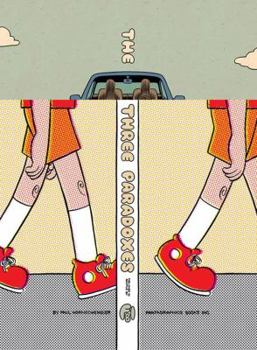The Three Paradoxes
Select Format
Select Condition 
Book Overview
The Three Paradoxes is an intricate and complex autobiographical comic by one of the most talented and innovative young cartoonists today. The story begins with a story inside the story: the cartoon character Paul Hornschemeier is trying to finish a story called Paul and the Magic Pencil. Paul has been granted a magical implement, a pencil, and is trying to figure out what exactly it can do. He isn't coming up with much, but then we zoom out of this...
Format:Hardcover
Language:English
ISBN:1560976535
ISBN13:9781560976530
Release Date:September 2006
Publisher:Fantagraphics Books
Length:80 Pages
Weight:0.94 lbs.
Dimensions:0.6" x 6.8" x 8.7"
Customer Reviews
3 ratings
Makes You Think, But It Could Have Been Much More
Published by Thriftbooks.com User , 14 years ago
What the author is doing in The Three Paradoxes is interesting. His narrative freely flows from a comic he is working on ("Paul and the Magic Pencil") and its distinctive style to his last night of a visit at home with his parents and a talk with his father, with its own distinctive style. It then goes to flashbacks from childhood ("Summer School") with its own style. The author's talk with his father then triggers another childhood memory ("The Scar") and finally delves into a discussion of Zeno's Paradoxes ("Zeno and His Friends"). The story ends with the author considering his potential future with a fan he is meeting, perhaps romantically, in a few days. It is fascinating to see the author's creative process as he comes up with new ideas for stories based on what he sees around him, and then to apply the discussion of the paradoxes to the structure of the story itself, which mirrors Zeno and his belief in the unchanging. The story, caught at the end in a single point in time, never really concludes, as Zeno's arrow never really reaches its target. The stories represent the author's own past, present, and (potential) future as moments in time, flowing from one to the next yet each a snapshot unto itself. That said, the book The Three Paradoxes comes across more as a philosophical or as an art school exercise than as a subject for a full graphic novel. As I was reading it occurred to me that Zeno's paradoxes might make a passable theme for a book in order to tie together several unfinished story fragments into one cohesive whole. Although the book makes you think a bit about the creative way it is structured, on the whole it feels a bit cobbled together. I would like to see the author continue with a fully realized story based on his time at home and back in the city. I understand that the story ending where it does serves to illustrate Zeno's paradoxes, but the book is slight and could go much further. Still, the book is very creative and makes you think, and that is more than many books can say. I am rounding up from 3 1/2 stars to 4 because The Three Paradoxes is at least trying to do something different. For another and more fully realized example of this type of free-flowing graphic novel using different styles to great effect you may want to try reading the terrific Asterios Polyp by David Mazzucchelli.
Good Trip
Published by Thriftbooks.com User , 17 years ago
Ok, so everyone's favorite game these days is to bash Hornshemeier for being a Ware ripoff. Honestly, people either aren't looking close enough or completely miss the point. I found his latest collection of work to be profoundly gripping and fluid in a way that I don't think I've ever read Ware. Ware's a master of detail, complexity and meta/self-reference. Hornshemeier has those at times, as Ware can also maintain a quicker pace, but it's rare that I don't get caught up in ware's details and miniature geometry. And here is where Hornshemeier really shines. While his space is usually limited to flat color, his writing and character development sometimes really float you through. The flashbacks in Three Paradoxes are like that for me in this book, and quite a nice countermeasure to the other elements of the book that read a bit slower. And he's just a beautiful illustrator in general. His faces, and the times he does take liberties with abstraction are always successful.
One to ponder...
Published by Thriftbooks.com User , 17 years ago
An interesting rumination on the concept of change and how it relates to the act of creation. Hornschemeier, on a walk with his father, mixes his observations of his old neighborhood with his struggles to finish a comic strip about youth, all the while indulging in memory and whimsy. Encounters with other people, stray bits of conversation, everything inspires some kind of mental tangent, what could be new fictional ideas, false memories, or something truly remembered. In one panel, Paul's young self passes on the street behind his current self, suggesting we are here now and we are here then, and we are always the same, like the three Zeno paradoxes of the title pulled through Vonnegut. (In another sequence of panels, do we break point of view and go into the head of Paul's father? If we do, for shame--but it could also be more mental meandering by Paul.) All the while, THE THREE PARADOXES is expertly drawn, shifting from a precise Tomine-esque style to parodies of old comic books for the backstory, as well as sublime little glimpses at the blue-pencilled pages Paul is working on. Still, by the end, even with all the heaviness of design, the book is a tad slight. Again, maybe by intention? Because it certainly does linger, like one of its narrator's memories, playing on the brain even as the book is reshelved






